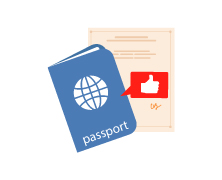To apply to a Russian university, prospective students have to properly prepare a package of documents. In certain cases, an applicant has to complete a recognition procedure for the degree from an international university.
Internationally recognised degree in Russia: what is it?
“Internationally recognised degree” is a popular phrase though officially, there is no such thing. Many countries, including Russia, joined the Bologna process to work out a uniform higher education standard. A uniform system of education levels was adopted. It enables a graduate who has been awarded a degree to pursue further studies in another country. Some countries require an applicant to complete the education document recognition procedure (see the list of countries). If your country and the Russian Federation have a bilateral academic degree recognition agreement, the recognition procedure is not required when you apply to a Russian university.
Legalisation of degree: what is it?
Legalisation is putting a stamp on an education document which enables the holder to show their degree abroad. Legalisation does not imply that your degree becomes “internationally recognised” or that it is automatically recognised in the country where you are going to present it; however, the stamp authenticates your degree.
If your country is a signatory to the Hague Convention of 1961, a fast track legalisation procedure - Apostille on education documents - is available to you. The degree can be shown not only in Russia, but also in more than 100 Hague Convention countries. If your country is not on this list, you have to authenticate the degree at the Russian consulate. This kind of legalisation is only valid in the territory of the Russian Federation.
Check if the degree awarded in your country needs an Apostille or consular legalisation here.
How to apostille a degree
Now you know how to do consular legalisation: you request it at the Russian consulate in your country while showing your ID and education document.
As for having your degree apostilled if your country is a Hague Convention signatory, it depends on your national regulations. In a majority of countries, this service is provided by the Education Ministry, Justice Ministry and Ministry of Foreign Affairs.
Do I have to attach the transcript to my degree for legalisation and recognition?
It depends on the regulations in the country where the degree is awarded: if a transcript is a legal part of the degree it has to be legalised as well.
Where to I apply for degree recognition procedure in Russia?
You can bring your documents in person to the National Information Centre office in Moscow or mail them to 51 Lyusinovskaya Str., Moscow, or email using your personal account on the NIC website.
Note that 46 Russian universities have the right to carry out the international education document recognition procedure on their own. If you apply to one of these universities, they will handle this paperwork.
Do I have to pay for the recognition certificate?
You only pay the Stamp Duty in the amount of 6,500 rubles. You get the Stamp Duty bill when you submit your documents.
How long does it take to have your education document recognised?
The standard processing period is 45 days, but it is usually shorter. If additional information is requested, the processing period might increase to 90 days.
Where do I collect the recognition certificate?
If you had NIC to handle the recogntion procedure, you can collect the certificate at the office of the organisation or receive it by post (the latter option requires you to state your address when submitting documents). An acquaintance of yours can get your certificate by notarised power of attorney. It is widespread practice to assign power of attorney to a representative of the University where you are planning to study.



























































